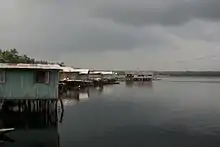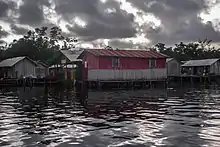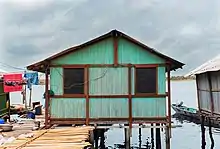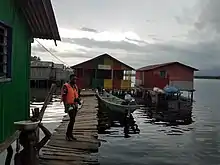

Nzulezo is a village located near the village of Beyin, 90 kilometers west of Takoradi, in the Jomoro District jomoro the Western Region of Ghana.[1] Over 500 people live in the community.[2]
Nzulezu overlooks Lake Tadane, and is entirely made up of stilts and platforms. In 2000, it was nominated as a UNESCO World Heritage Site, and is a major tourist attraction area.[1] The site is increasingly a source of tourism, with tourist coming to experience the village as well as a local alcohol produced in the village.[2]
Etymology
The name "Nzulezo" in the Nzema language means "water surface", and is a village on stilts of "Ewuture" origin situated close to the northwest shore.[3] The "Ewuture" maintained the waterways and transportation of goods and people.[3] According to local legend, the village was built by a group of people from Oualata, a city in the ancient Ghana Empire and in present-day Mauritania, which came about from following a snail. The snail is therefore a totem and revered by the people of Nzulezo.[4]
Construction

Nzulezu was built over Lake Tadane. The settlement of Nzulezo consists of stilt-supported structures.[1]
The reason Nzulezo was built over water was for protection and safety during attacks in times of war since it lies five miles inland of the Southwest shores.[3]
The main activities of its inhabitants is agriculture, while fishery plays a secondary role. The lake is perceived by the local population to protect against certain risks (e.g. a fire).[1] The village did have some of the houses partially submerged from a flood in 2009.[5]
Services
The village has a limited number of nurses and health care capacity.[2]
There is a primary school and after primary school learners have to leave the village to go for secondary schools and universities.[6] However, as of 2019 there were a shortage of teachers for the community.[2]
World Heritage Status
This site was added to the UNESCO World Heritage Tentative List on January 17, 2000, in the Cultural category.[1]
The village was nominated to become a World Heritage Site for its importance in anthropology: in addition to being one of the few ancient settlements on stilts and platforms left in the world, there is a preserved wealth of local traditions connected with the cult of the lake.[1] Lake Tadane occurs on the banks of all religious rites, and Thursday, is a day sacred to the lake, and it is forbidden to use and work on the lake for any activity throughout the day of Thursday.[1]

In recent times the village has been opened to tourism, but with certain constraints (visitations are allowed only once a week).[1] The village can be reached only by a canoe; the route, which crosses the rain forest, takes about an hour to 5 km away. In the village there is a church and a school. As the village is extremely isolated, Nzulezo suffers from numerous health problems, including the vast spread of malaria.[1]
Nearby sites
- Ankasa Nature Reserve
- Fort Apollonia
- Childhood home of Kwame Nkrumah, the first president of an independent Ghana
Gallery
 Nzulezo bamboo house community
Nzulezo bamboo house community Nzulezo at daytime
Nzulezo at daytime
References
- 1 2 3 4 5 6 7 8 9 Nzulezu Stilt Settlement - UNESCO World Heritage Centre Retrieved on 2009-03-26.
- 1 2 3 4 Aisha Salaudeen and Rachel Wood. "Ghana's floating village is trying to balance its ancient traditions in a modern world". CNN. Retrieved 2022-04-22.
- 1 2 3 Valsecchi, Pierluigi (2011). Power and state formation in West Africa : Appolonia from the Sixteenth to the Eighteenth Century. Allan Cameron. New York: Palgrave Macmillan. ISBN 978-0-230-37069-2. OCLC 892799728.
- ↑ "Nzulezo Stilt Village". touringghana.com. 2016-03-21. Retrieved 2021-01-05.
- ↑ "Floods Hit Western Nzema". Modern Ghana. Retrieved 2022-04-22.
- ↑ Aisha Salaudeen and Rachel Wood. "Ghana's floating village is trying to balance its ancient traditions in a modern world". CNN. Retrieved 2021-01-05.
05°01′14″N 02°35′52″W / 5.02056°N 2.59778°W
| Library resources about Nzulezo |
| By Nzulezo |
|---|